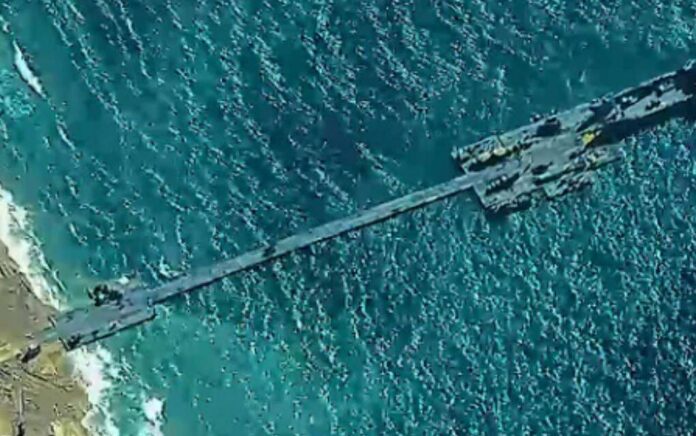
Joe Biden has had countless defeats during his time as president. But this one might be the worst yet.
As one of Biden’s biggest failures has finally been exposed and it’ll make your jaw drop.
President Biden’s $230M Gaza Aid Pier Fails Miserably Amid Weather and Security Challenges
In an attempt to support humanitarian aid efforts in Gaza, President Biden pressed forward with a $230 million pier project, despite internal concerns from federal aid workers.
According to a report from the US Agency for International Development (USAID) Office of the Inspector General (OIG), the pier, intended to deliver essential supplies to the Hamas-controlled region, provided far less assistance than planned.
Biden had unveiled the pier project during his State of the Union address on March 7, aiming to supply food and medical aid to 1.5 million Palestinians over three months. The White House portrayed the pier as a vital lifeline.
However, just 20 days of operation were hampered by “rough weather and high seas,” leading to the delivery of aid for only 450,000 Palestinians, far short of the original target. The pier was ultimately decommissioned on July 17.
The OIG report outlined that the pier’s limited operational period wasn’t the only challenge. Three service members were injured, one critically, during the pier’s brief use.
Additionally, critics, including some within the USAID, had expressed concerns early on that focusing on the pier might divert attention from more effective land-based methods of delivering aid.
Despite these warnings, President Biden framed the pier as a critical solution to the escalating humanitarian crisis in Gaza. “This temporary pier would enable a massive increase in the amount of humanitarian assistance getting into Gaza every day,” he assured Congress.
Yet, behind the scenes, several USAID staff members voiced their reservations, arguing that land crossings could transport aid more efficiently. Once Biden’s directive was issued, however, the agency focused on making the pier work as effectively as possible.
The project faced additional hurdles due to the lack of prior planning. USAID had to scramble to coordinate with the Department of Defense (DoD) and the State Department, submitting a formal request for assistance nearly three weeks after Biden’s announcement. While the DoD had experience with similar operations, it had never attempted one in an active combat zone, which further complicated the logistics.
International organizations, including the UN’s World Food Program (WFP), were also apprehensive. The WFP’s own documentation cautioned that the pier’s maritime corridor posed “significant safety and security risks” and could expose its operations to substantial danger.
Their warnings proved prescient as the humanitarian mission faced multiple instances of looting and attacks. Aid workers reported that supplies were stolen after being brought ashore, and WFP warehouses were targeted, with drivers facing detainment or violence.
The challenging environment added to the difficulties, with bad weather and overcrowded roads making it nearly impossible to move aid from the pier to distribution centers.
The IG report also highlighted the concerns about the perception of the pier’s militarization, which led to further resistance from the Palestinian community.
In the aftermath of the pier’s failure, the OIG report acknowledged that the operation had fallen short of its ambitious goals. It pointed to the compounded issues of operating in a conflict zone, including harsh weather, security threats, and limited humanitarian access, as key reasons the aid could not be delivered as promised.
Despite the best intentions behind the initiative, Gaza’s humanitarian crisis remains dire. USAID warned that nearly 1.9 million displaced Palestinians continue to face dire conditions, including severe shortages of food, water, and medical care. With about 96% of the population experiencing severe food insecurity, the risk of famine remains alarmingly high.
In summary, President Biden’s $230 million pier project, though undertaken with the goal of easing the humanitarian disaster in Gaza, greatly failed due to significant logistical, environmental, and security challenges.
Stay tuned to The Federalist Wire.



















